MercoPress. South Atlantic News Agency
Tag: Mauricio Macri
-
Sunday, August 26th 2018 - 02:35 UTC
Macri blames the lack of infrastructure to rampant corruption under the Kirchners
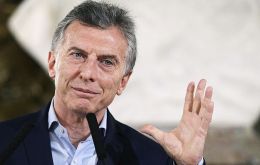
Argentine president Mauricio Macri linked the poor state of the country's infrastructure to the so called “K corruption notebooks”, but also praised that truth is coming to light and in just two years Argentina's standing in the Transparency rating had gone from position 54 to 17.
-
Friday, August 24th 2018 - 08:50 UTC
Argentina’s economy contracts in June for the third month running
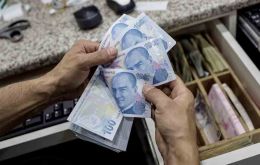
Argentina’s economy contracted 6.7% in June compared with the same month last year, and 1.3% compared with May, government statistics agency Indec said on Thursday. June was the third consecutive month of decline following 5.2% in May and 0.6% in April.
-
Tuesday, August 21st 2018 - 08:40 UTC
Macri to report Venezuelan government to the International Criminal Court
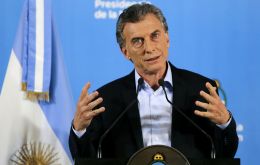
Argentine President Mauricio Macri plans to report Venezuela’s government to the International Criminal Court at The Hague for alleged crimes against humanity, according to an interview broadcast on CNN’s Spanish service on Sunday night. Macri said he would seek to refer populist President Nicolas Maduro’s government “in the coming weeks”, and that he had the backing of the presidents of Colombia, Chile and Paraguay.
-
Saturday, August 18th 2018 - 07:00 UTC
Macri anticipates more Argentines will fall into poverty this year
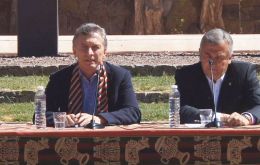
More Argentines are likely living in poverty now compared with last year, President Mauricio Macri said on Friday, as the country's economy slides toward recession following a currency crisis and a severe drought that harmed farm output.
-
Tuesday, August 7th 2018 - 07:01 UTC
Construction executives confirm bribe payments in exchange for contracts under Kirchner governments
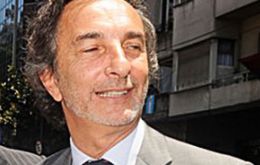
Argentine prosecutors questioned a construction executive related to President Mauricio Macri on Monday as part of a sprawling investigation into bribe payments made to the former government. Angelo Calcaterra, the former head of construction company Iecsa and Macri’s cousin, told prosecutors he was told by officials in former President Cristina Fernandez’ administration to pay cash in exchange for public works contracts.
-
Thursday, August 2nd 2018 - 07:24 UTC
Macri admits annual inflation will reach 30%, “product of this storm”
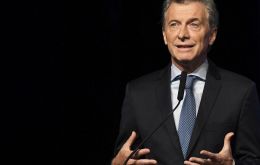
Argentina's President Mauricio Macri is acknowledging for the first time that the country's annual inflation rate will be 30%. Macri said Tuesday that the high consumer prices “unfortunately are a product of this storm.” He was referring to a sharp devaluation of Argentina's currency and a recent run on the Peso.
-
Tuesday, July 31st 2018 - 10:26 UTC
BRICS' leaders support Argentina's economic strategy, claims president Macri

Leaders from the BRICS bloc of emerging economies share a “positive outlook” on Argentina's embattled economy, President Mauricio Macri said on Monday. Macri added that leaders from BRICS members - Brazil, Russia, India, China and South Africa - meeting in Johannesburg for the July 25-27 summit also expressed their support for the Argentine government's economic strategy.
-
Thursday, July 26th 2018 - 08:47 UTC
Macri joins the BRICS summit in South Africa

Argentine president Mauricio Macri leaves for South Africa this Thursday to participate in the annual BRICS summit, where Brazil, Russia, India, China, and South Africa come together to discuss common issues.
-
Thursday, July 26th 2018 - 06:54 UTC
Dissatisfaction with Argentine government reaches 76%; Macri's support down to 31%

An overwhelming majority of Argentines, 76%, are concerned with the financial turbulence and deeply dissatisfied with the poor performance of the economy according to a monthly survey from the University of San Andrés, its lowest point since the peak reached in October 2017 following the victory of president Mauricio Macri's coalition in the midterm elections.
-
Thursday, July 26th 2018 - 06:16 UTC
Argentina defense minister insists that Armed forces will not intervene in social conflicts
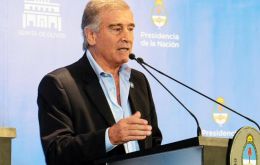
Defense Minister Oscar Aguad has rejected the idea that modifications to the Defense Bill will give Argentina's Armed Forces the power to intervene in social conflicts. He also underlined the military will not replace the Gendarmerie along the borders. The comments follow demands from the opposition to have Congress address the issue.
